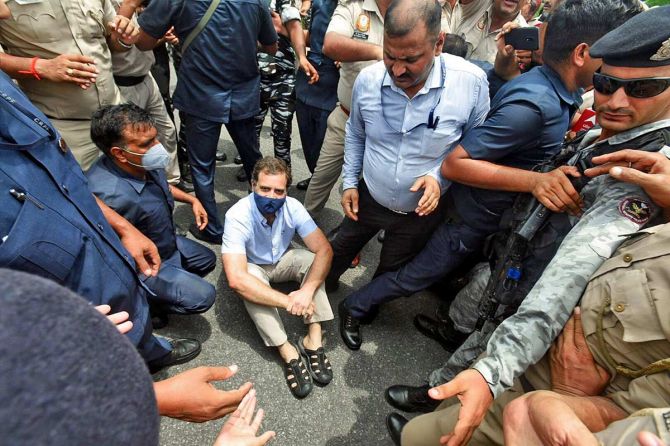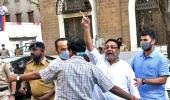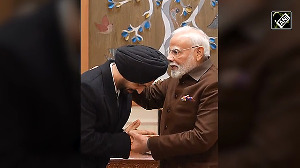If the fear of ED could drive the powerful people of today to be honest or at least be minimally corrupt, will it not be a great thing for our nation?, asks Sudhir Bisht.

The Directorate of Enforcement, commonly referred to as ED, is an agency that works under the department of revenue, which in turn functions under the ministry of finance. The Directorate has the responsibility of implementing three crucial laws that are aimed at prevention of corruption and thereby safeguarding the interests of our nation.
1. The Foreign Exchange Management Act (FEMA, 1999) regulates all the current account transactions as well as capital account transaction involving foreign countries.
2. The Prevention of Money Laundering Act (PMLA, 2002) aims at preventing money laundering in India. Money laundering in simple terms is the act of converting 'black money' (earned by carrying out illegal activities or by concealing taxes) into 'white money'.
Money laundering is done by organised crime syndicates and it attacks the economic edifice of a nation. Money laundering ensures that the gains of illegal activities like illegal betting rackets, human trafficking, tax evasion, and extortion income etc, flow back to the perpetrators of these crimes in an ostensibly legal manner.
3. ED also is responsible for enforcing the Fugitive Economic Offenders Act (FEOA, 2010). This Act enables the State to confiscate the moveable and immovable assets of offenders who are on the run and have fled from our country. This is a powerful law and the fugitives (absconding offenders) risk forfeiture of their right to recourse to civil courts if they are booked under FEOA.
The ED has been recently under heavy artillery attack from the Opposition parties who have blamed the National Democratic Alliance government of misusing the agency for targeting leading politicians of opposition parties.
A general perception is sought to be created that the ED is only interested in cornering Opposition leaders so that the ruling dispensation can silence their vocal critics.
However, an examination of recent asset-attachment record would show that ED has taken serious action against many corporates that are accused of money laundering and FEMA violations.
The Directorate cannot be expected to look the other way just because the investigation may reveal the involvement, direct or indirect, of politicians.
The ED order of provisional attachment of assets worth Rs 1,621 crores (Rs 16.21 billion) of Corporate Ispat Alloys Limited or CIAL, a company in Jharkhand, is one of the most high profile cases being handled by it.
In 2005 the coal ministry awarded the Chitarpur coal mine to CIAL with the condition that within three years the coal blocks would commence production and the coal would be used for CIAL's own specified sponge iron and power projects.
It was later found out that CIAL had misrepresented the facts for obtaining the coal blocks. After the coal blocks were allotted, nearly Rs 1,900 crore (Rs 19 billion) capital was raised by CIAL at a huge premium.
The fact that CIAL had been awarded coal blocks was used to raise funds and the proceeds were invested in fixed capital. No coal has been produced at the Chitarpur coal blocks till date.
The ED has attached the properties of CIAL and the investigation is ongoing. From the various newspaper reports, it is clear that politicians of more than one party may be involved and just because there are politicians involved, the ED can't be allowed to remain a passive spectator.
In the case of Amway India Enterprise Pvt Ltd, the ED has attached its assets worth Rs 755 crores (Rs 7,55 billion) for an alleged multi-level marketing scam. There is hardly any political angle in this high profile attachment order made by ED as yet. There is no hue and cry against the ED action, but it may change if any political involvement is unearthed in this case.
There have been some high profile cases that the ED is handling right now, involving our political leaders.
On top of the list is the alleged National Herald money laundering case.
The National Herald is one of the oldest newspapers in India and it played an important role in mobilising public opinion against the British Raj. It is owned by Associated Journals Limited (AJL). Over the years, the National Herald lost its readership and had turned unviable.
AJL took loans to the tune of Rs 90 crores (Rs 900 million) from the Indian National Congress (INC) over a prolonged period of time. AJL was unable to pay the loan and in a complicated process involving INC, AJL and a commercial organisation called Young India (YI), 90% shares of AJL were sold to YI for a trifling sum of Rs 50 lakhs (Rs 5 million).
The Rs 90 crore loan that AJL was supposed to pay the INC was also waived off for a negligible amount. YI in effect became the owner of AJL and the source of funding of YI is alleged to have come from questionable sources.
The main issue, however, is that Congress President Sonia Gandhi and her son Rahul Gandhi own 76% of YI. A serious case of conflict of interest between related parties is clearly at play here. The ED is investigating the entire transaction, including the source of funding of YI.
The enfant terrible of Indian politics, Dr Subramanian Swamy, the man who singlehandedly forced an investigation into the not-so-clean looking deal between AJ and YI, estimates the properties of AJL to be worth Rs 2,000 crores (Rs 20 billion). He accuses the Congress president and her son of an illegal and unethical takeover of AJL for a negligible price.
It indeed looks like a case of soft surrender of AJL to YI and there is no government in the world that can overlook a controversy of such massive scale. The ED's investigation into the deal looks very legitimate to most observers of Indian politics.
In a surprisingly well-organised and calculated response, the INC ensured that its workers hit the streets when Rahul Gandhi was recently interrogated by the ED for five days. The ED also questioned the ailing Sonia Gandhi over three days, and Congress leaders protested inside and outside Parliament. They called it political vendetta and labelled the ED a tool in the hands of the NDA government, misused to silence the voice of the principal Opposition party.
In an ironical twist of events, Congress workers have been protesting in West Bengal, demanding action against Partha Chatterjee, who has been arrested by the same Enforcement Directorate in the 'teacher recruitment scam'.
As I turned to page 11 of The Hindu (July 25, 2002) I saw a photograph that is captioned 'Up in arms: Congress workers staging a protest in Nadia district on Sunday demanding action against Partha Chaterjee'.
The message is clear to me. ED action is in the interest of the country if it involves a minister of a rival political party, the TMC in the case of the alleged teacher recruitment scam. However, the ED action is vindictive and mala fide if it has the INC president or her son at the receiving end.
Then there is another case that involves the Aam Aadmi Party's health minister Satyendra Jain. The Delhi minister has been lodged in Tihar jail under the PMLA Act. The ED has conducted several raids at the offices of those who are close associates of Jain and has been able to ensure that he is not granted bail by the court, and this is seen as a setback to Jain. AAP leaders and its Delhi CM have branded the action of ED as vindictive.
I would like to remind the Delhi CM and his party colleagues that a few days before Punjab went to polls, the ED had raided the house of a close relative of the then CM of Punjab (Charanjit Singh Channi) and had found Rs 8 crore (Rs 80 million) in cash.
The Delhi CM had then gloated, 'Do the people of Punjab want to elect such a man as CM who has serious allegations of illegal sand mining and has corruption charges related to transfers and posting (of state government officials)?'
I have quoted two examples from the recent past to prove that Opposition parties pick and choose the ED's action to slander them. The fact is that whenever the ED has proceeded against any corrupt individual or organisation, it has done so if there was at least one substantial reason for initiating proceedings against that person or organisation.
It is not entirely impossible that the ED is acting primarily against the non-NDA politicians for their involvement in activities linked to FEMA or PMLA. But the fact is that in whichever case the ED has started its proceedings, a lot of financial skulduggery has been unearthed.
It is said that the ED's rate of obtaining conviction is under 1% of all the cases that it has investigated.
I am not disheartened by this low rate of conviction. I also know that just because an accused cannot be convicted -- given the state of an overburdened judiciary, a lax police force and supremely cunning minds of the lawbreakers -- it shouldn't mean that we should let the corrupt go unchallenged.
P Chidambaram has said that in case of ED investigations, 'the process is the punishment.'
I believe that the public does get some solace when the seemingly corrupt are massively discomfited, even if they manage to escape conviction.
In addition, on the allegation that the ED acts only against the opponents of its political masters, I would like to draw the attention of the readers to its positive side.
The people who are in positions of power today must be aware that they could be out of power some day. The same ED may act against them if there is a regime change at the Centre and if they leave any trail of corruption.
Since every act of corruption does always leave quite a few telltale signs, it is best that they (the leaders of today) remain free from corruption.
If the fear of ED could drive the powerful people of today to be honest or at least be minimally corrupt, will it not be a great thing for our nation?
Dr Sudhir Bisht, author and columnist, writes from New Delhi.











 © 2025 Rediff.com -
© 2025 Rediff.com -